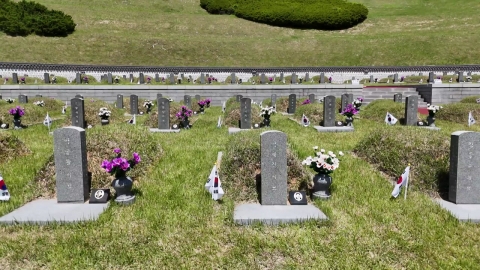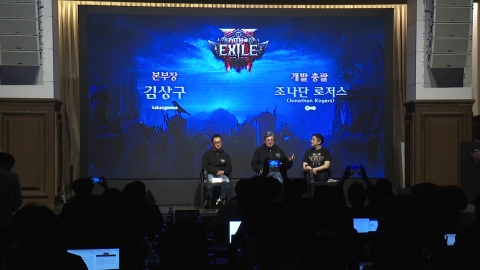[On-site video+] "The government will push ahead with medical reform projects at a pace."
[Anchor]
The 4th general meeting of the ruling and opposition parties' government consultative body to resolve the
political conflict was held at the National Assembly a little while ago.
However, the gap between the government and the medical community over the number of medical schools for next year, which is a key issue, has not narrowed,
Medical groups are expected to announce the suspension of participation in the consultative body due to growing opposition from the medical community over the ruling party's support for the establishment of a local medical school,
.
I'll connect you directly to the consultative briefing site.
[Lee Manhee]
The medical community and the government and the ruling party have held four parliamentary consultative meetings since November 11 to discuss various topics such as increasing medical personnel, evaluating medical institutions, and expanding mutual understanding.
Some consensus has been formed to ensure the autonomy of the Medical Council, and it has been agreed to suspend some changes to the revised ordinance of the evaluation criteria of higher education institutions related to the Medical Council for the time being.
Regarding the special committee on medical reform, it was decided to fully collect opinions from the medical community on the reorganization and discussion of the special committee on medical reform.
However, the medical community has been constantly requesting changes to the number of medical schools in 25.
This was a very difficult demand to accept realistically considering the considerable progress of the entrance examination.
In view of this situation, representatives of the ruling and opposition parties' government consultative bodies decided to suspend official meetings and take a break for the time being.
Conversations between participating parties, including the medical community, will continue during the break.The ruling party will continue to hold dialogue with the medical community so that it can resolve the issue as soon as possible, in accordance with the will of the people who agree on the need to promote medical reform, such as increasing the number of
doctors.
The Prime Minister, the President's Office, the Chief Policy Officer, and the Minister of Education and Welfare participated in the effort to make prompt decisions, and I sincerely thank the representatives of the medical community, including Lee Jin-woo, chairman of the Korean Medical Association, and Lee Jong-tae, chairman of KAMC, for participating in the consultative body despite the difficult conditions.
For the health and life of the people, I sincerely ask the government and the medical community to participate in the consultation in a more flexible manner in the future.
Finally, I would like to express my regret once again to the Democrats who did not participate in the consultative body until the end and urge them to participate in the consultative body later.
[MC]
We will receive questions and answers from reporters after the government's Vice President Lee Ju-ho speaks.
[Juho]
For the government, which has tried to resolve the conflict through dialogue, I think the ruling and opposition party council, which has been busy discussing fiercely, has had time to take a break and reorganize. I think the in-depth discussions between the ruling and opposition parties helped both sides understand each other's positions and resolve misunderstandings.
I think this will be a great addition to the government's push for medical reform in the future.
Regarding the controversial admission quota for the 2025 school year, we clearly state here that it is impossible for the government to take any action that causes confusion because it puts a huge burden on the educational field, including the examinee.
However, from the 2026 quota, if the medical community participates in the doctor's estimation committee and presents its opinion, the government will discuss it with the medical community regardless of the number at the estimation committee.
In fact, considering the entrance examination schedule for 2026, there is not much time to discuss. Even at this moment, I feel sorry that the time to discuss is gradually decreasing.
The various ongoing healthcare reform challenges go far beyond simple quota adjustments and are essential policies to maintain people's lives and a sustainable global healthcare system.
The normalization of essential medical care and the development of local medical care, which are the core goals of medical reform, are policies that can never be stopped for the people and patients.
The government will constantly and speedily promote medical reform tasks to produce results of reforms that can be felt by the public and the medical community.
The government is ready to put its head together with the medical community to push for healthcare reform.
Lastly, despite the difficult conditions, I sincerely thank Lee Jin-woo, president of the Korean Medical Association, Lee Jong-tae, chairman of KAMC, and many other medical officials for participating in the ruling and opposition council to discuss and speak about the medical community's position.
I look forward to starting the conversation again with more medical organizations soon.
※ 'Your report becomes news'
[Kakao Talk] YTN Search and Add Channel
[Phone] 02-398-8585
[Mail] social@ytn.co.kr
The 4th general meeting of the ruling and opposition parties' government consultative body to resolve the
political conflict was held at the National Assembly a little while ago.
However, the gap between the government and the medical community over the number of medical schools for next year, which is a key issue, has not narrowed,
Medical groups are expected to announce the suspension of participation in the consultative body due to growing opposition from the medical community over the ruling party's support for the establishment of a local medical school,
.
I'll connect you directly to the consultative briefing site.
[Lee Manhee]
The medical community and the government and the ruling party have held four parliamentary consultative meetings since November 11 to discuss various topics such as increasing medical personnel, evaluating medical institutions, and expanding mutual understanding.
Some consensus has been formed to ensure the autonomy of the Medical Council, and it has been agreed to suspend some changes to the revised ordinance of the evaluation criteria of higher education institutions related to the Medical Council for the time being.
Regarding the special committee on medical reform, it was decided to fully collect opinions from the medical community on the reorganization and discussion of the special committee on medical reform.
However, the medical community has been constantly requesting changes to the number of medical schools in 25.
This was a very difficult demand to accept realistically considering the considerable progress of the entrance examination.
In view of this situation, representatives of the ruling and opposition parties' government consultative bodies decided to suspend official meetings and take a break for the time being.
Conversations between participating parties, including the medical community, will continue during the break.The ruling party will continue to hold dialogue with the medical community so that it can resolve the issue as soon as possible, in accordance with the will of the people who agree on the need to promote medical reform, such as increasing the number of
doctors.
The Prime Minister, the President's Office, the Chief Policy Officer, and the Minister of Education and Welfare participated in the effort to make prompt decisions, and I sincerely thank the representatives of the medical community, including Lee Jin-woo, chairman of the Korean Medical Association, and Lee Jong-tae, chairman of KAMC, for participating in the consultative body despite the difficult conditions.
For the health and life of the people, I sincerely ask the government and the medical community to participate in the consultation in a more flexible manner in the future.
Finally, I would like to express my regret once again to the Democrats who did not participate in the consultative body until the end and urge them to participate in the consultative body later.
[MC]
We will receive questions and answers from reporters after the government's Vice President Lee Ju-ho speaks.
[Juho]
For the government, which has tried to resolve the conflict through dialogue, I think the ruling and opposition party council, which has been busy discussing fiercely, has had time to take a break and reorganize. I think the in-depth discussions between the ruling and opposition parties helped both sides understand each other's positions and resolve misunderstandings.
I think this will be a great addition to the government's push for medical reform in the future.
Regarding the controversial admission quota for the 2025 school year, we clearly state here that it is impossible for the government to take any action that causes confusion because it puts a huge burden on the educational field, including the examinee.
However, from the 2026 quota, if the medical community participates in the doctor's estimation committee and presents its opinion, the government will discuss it with the medical community regardless of the number at the estimation committee.
In fact, considering the entrance examination schedule for 2026, there is not much time to discuss. Even at this moment, I feel sorry that the time to discuss is gradually decreasing.
The various ongoing healthcare reform challenges go far beyond simple quota adjustments and are essential policies to maintain people's lives and a sustainable global healthcare system.
The normalization of essential medical care and the development of local medical care, which are the core goals of medical reform, are policies that can never be stopped for the people and patients.
The government will constantly and speedily promote medical reform tasks to produce results of reforms that can be felt by the public and the medical community.
The government is ready to put its head together with the medical community to push for healthcare reform.
Lastly, despite the difficult conditions, I sincerely thank Lee Jin-woo, president of the Korean Medical Association, Lee Jong-tae, chairman of KAMC, and many other medical officials for participating in the ruling and opposition council to discuss and speak about the medical community's position.
I look forward to starting the conversation again with more medical organizations soon.
※ 'Your report becomes news'
[Kakao Talk] YTN Search and Add Channel
[Phone] 02-398-8585
[Mail] social@ytn.co.kr
[Copyright holder (c) YTN Unauthorized reproduction, redistribution and use of AI data prohibited]
Editor's Recomended News
-
[Exclusive] 'Controversy over business trip to Australia ahead of retirement' Sejong Fire Department suddenly canceled it after he said he was being invited.
![[Exclusive] \'Controversy over business trip to Australia ahead of retirement\' Sejong Fire Department suddenly canceled it after he said he was being invited.](//image.ytn.co.kr/general/jpg/2024/1201/202412011103517814_h.jpg)
-
"The state compensates the victims of May 18 for 43 billion won in mental damages"...Supreme Court confirmation

-
Adolescents Deepfake Unusual Judgment...Criticism of "mechanical interpretation"

The Lastest News
-
The new leader of Japan's second opposition party, Osaka Prefecture...History of opposition to the 'Girls Award' exhibition
-
Syrian rebels retake Aleppo, then advance to the central part of the country.
-
재생
![[Capture News] Despite the pandemic catastrophic warning...The U.S. Bombed the World Health System](https://image.ytn.co.kr/general/jpg/2024/1201/202412011912275492_h.jpg) [Capture News] Despite the pandemic catastrophic warning...The U.S. Bombed the World Health System
[Capture News] Despite the pandemic catastrophic warning...The U.S. Bombed the World Health System -
재생
![[Weather] There's no big cold tomorrow...Temperature from Tuesday 'tuk'](https://image.ytn.co.kr/general/jpg/2024/1201/202412011853358726_h.jpg) [Weather] There's no big cold tomorrow...Temperature from Tuesday 'tuk'
[Weather] There's no big cold tomorrow...Temperature from Tuesday 'tuk'
![[Exclusive] \'Controversy over business trip to Australia ahead of retirement\' Sejong Fire Department suddenly canceled it after he said he was being invited.](http://image.ytn.co.kr/general/jpg/2024/1201/202412011103517814_h.jpg)



![[Yetterview] 13 pounds](https://image.ytn.co.kr/general/jpg/2024/1201/202412011322579744_h.jpg)
![[EXCLUSIVE] QWER's Pleasant Storm Growth...The first solo fan concert in January next year.](https://image.ytn.co.kr/general/jpg/2024/1201/202412010800078803_h.jpg)
![[Y ranking] Best fashion item, Worries vs. The worst, Moon Jeonghee.](https://image.ytn.co.kr/general/jpg/2024/1201/202412010800013199_h.jpg)


